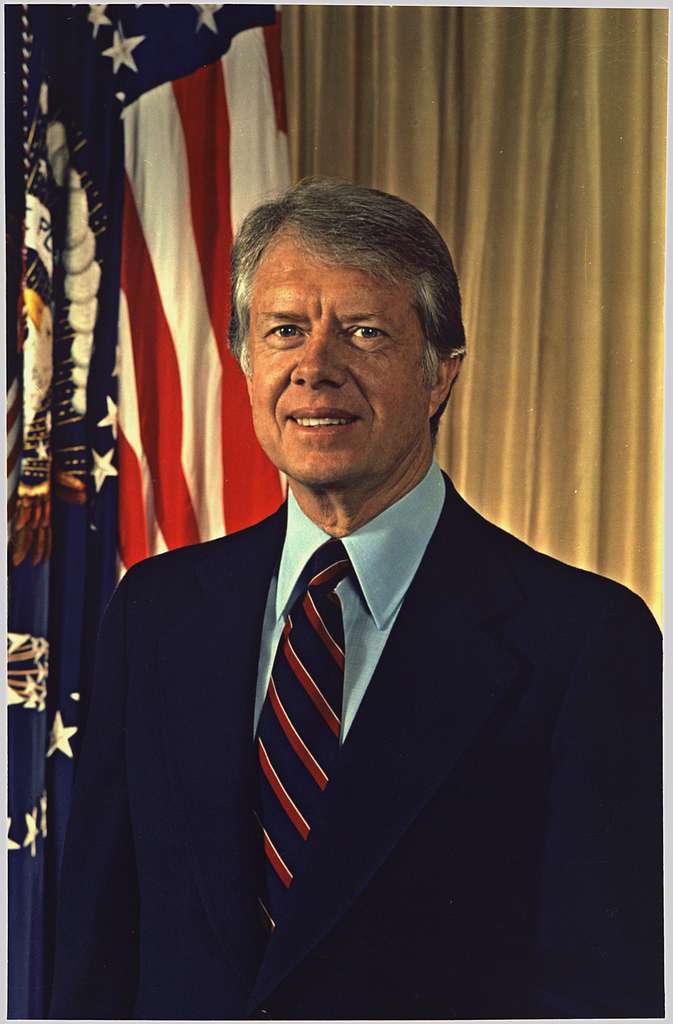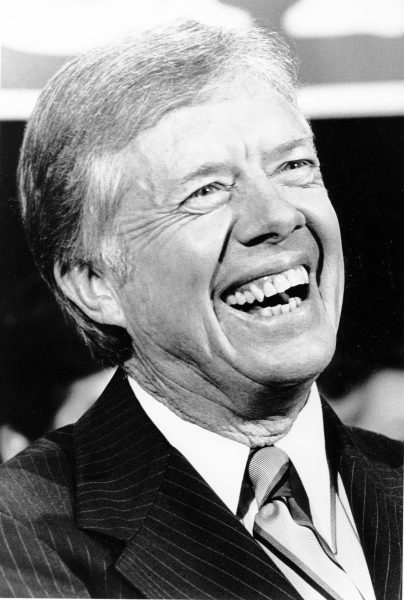
As former president Jimmy Carter is drawing closer to his 100th birthday in October of this year, lots of people are debating whether or not he will actually make it. Some believe that his rapidly deteriorating health will prevent him from doing so, while others think it is possible so long as he receives much-needed healthcare and family support. In either case, it is important to remember who Jimmy Carter was, and what made him so special to the face of America, 43 years since he was president.
James Earl Carter Jr. was born on October 1, 1924 in the small rural town of Plains, Georgia. The oldest of four children of businessman James Earl Carter Sr. and nurse Lillian Gordy Carter, he moved across the South several times while helping his community by supplying them with one of his most long-time treasured possessions: peanuts. He then attended the United States Naval Academy in 1943, and shortly after his graduation in 1946, he married 19-year-old Rosalynn Smith. They would go on to be together for 77 years and have four children, including Jack and Amy.
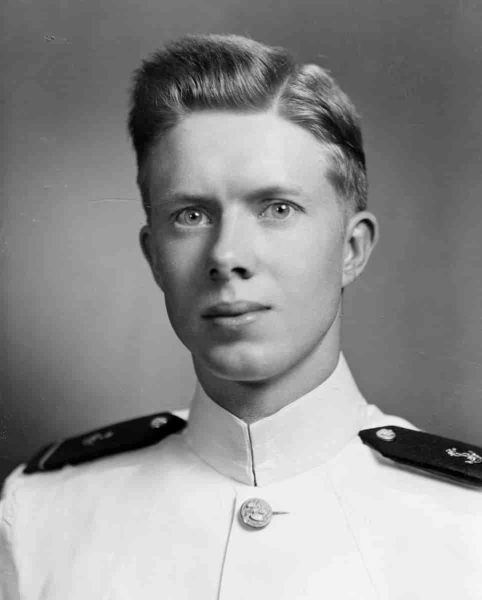
From 1946 to 1961, Carter served as Lieutenant of the United States Navy, where he won 4 medals. After stepping down from his position, he took on life as a politician. First, he served in the Georgia State Senate from 1963 to 1967, representing the 14th district. Then, from 1971 to 1975, he served as the 76th Governor of Georgia. A couple of actions he took during his governorship were reducing deficit spending and desegregating all areas of life in the South.
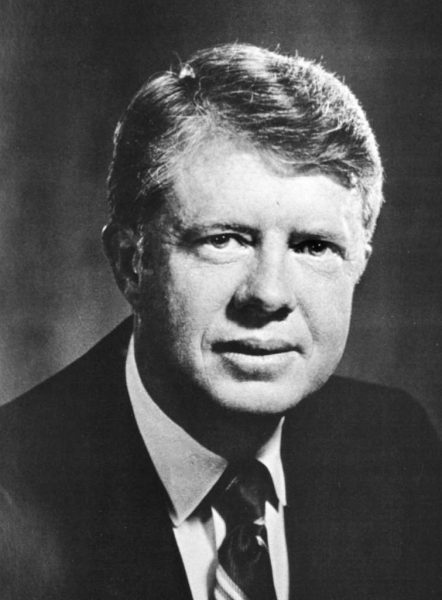
In 1974, Carter announced he would be running for president in the 1976 election against the incumbent Gerald Ford. He and his running mate Walter Mondale defeated Ford and his running mate Bob Dole in a landslide, and Carter was sworn in as the nation’s 39th president on January 20, 1977. In his presidency, he made a number of big changes to the country. First, he called for a rationing of gasoline in the world. Then, he signed the Department of Education Organization Act to improve the availability of public schools for over 43,000 children. Then, when the amount of energy was becoming a problem, he established a national energy policy and set up the United States Department of Energy. Perhaps his biggest accomplishment was negotiating the Camp David Accords with Egypt and Israel in 1978. These agreements eased the relationship between the two foreign countries, as they often disagreed over the treatment of their citizens. Eventually, thanks to Carter stepping in, Israeli Prime Minister Menachem Begin and Egyptian President Anwar Sadat put their differences aside, leading to a treaty and a shared Nobel Peace Prize.
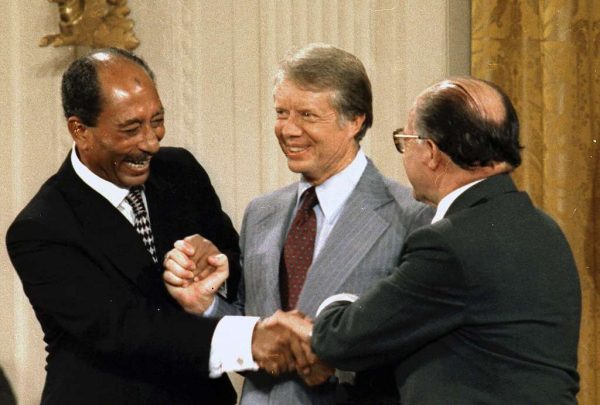
His next big move came in the form of the 1979 Iran Hostage Crisis, when over 50 Americans were held hostage by Iranian students for 444 days. Carter took the responsibility of imposing economic sanctions against Iran, resolving possible military interference, and other measures to safely release the victims. His last major move in office was maintaining peaceful relations with the Soviet Union, as the Cold War was still raging on. In 1980, he lost his chance of re-election to former actor and California Governor Ronald Reagan.

Since stepping down from office in 1981, Carter has remained socially and politically active. In 1982, he founded the Carter Center, a human rights organization that helps improve everyday lives of people in more than 80 countries and reinforced his name into a positive public image worldwide. In 1983, he revisited Egypt for a meeting with the Palestine Liberation Organization. In 1994, he helped President Bill Clinton outline a peace treaty with Kim II Sung, Supreme Leader of North Korea. In 2002, thanks to his role in the Carter Center, he won the Nobel Peace Prize for his ability “to find peaceful solutions to international conflicts, to advance democracy and human rights, and to promote economic and social development.” In 2006, he publicly expressed his concerns and disagreements with Israel’s foreign and domestic policies, but said that he still supported them. The following year, in 2007, he traveled to a number of Middle Eastern countries, particularly South Africa to meet President Nelson Mandela, where he worked on securing fair human rights policies and peace treaties. In terms of American leadership, on the other hand, Carter has widely criticized most of the presidents who came after him, with Barack Obama and Joe Biden being the only ones he was very pleased with.
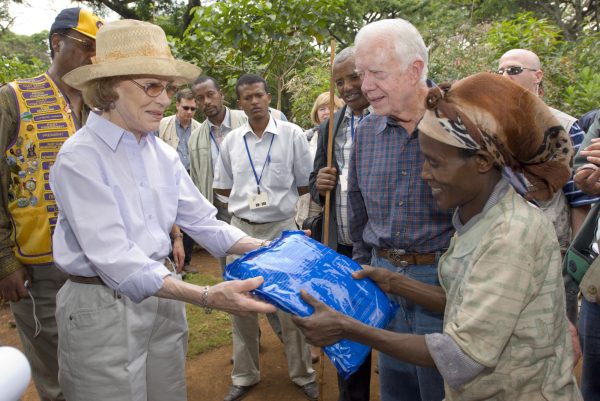
Also since the end of his presidency, Carter has achieved a number of milestones. After the death of Gerald Ford in 2006, Carter became the earliest-serving president still living. In 2012, he surpassed Herbert Hoover’s 31-year-long record and has since been the longest retired president. In 2017, he became the first president to live past the 40th anniversary of his inauguration and the oldest president to attend a new president’s inauguration, that president being Donald Trump. But most importantly of all, in March 2019, he surpassed the record previously held by George H. W. Bush and became the nation’s longest lived president, as well as being the first president to reach the ages of 95, 96, 97, 98, and 99.
However, his past health problems have led some people to believe that his chances of reaching 100 could be jeopardized. In August 2015, he was diagnosed with cancer that had to be treated by removing a small mass on his liver, but by the end of the year had been completely cured. In May 2019, he broke his hip in Plains, and then five months later in October, he had another fall at his home, leaving him with a black eye. He also fractured his pelvis after a third fall at home, but by November was able to keep teaching Sunday school. That same month, however, he was admitted to the hospital to relieve pressure on his brain caused by bleeding from falls, and in December, he was admitted for a urinary tract infection. But the biggest toll to take a turn for the worse was in February 2023, when his family disclosed that he had a terminal illness that required round-the-clock hospice care, which is treatment for someone who is clearly nearing the end of their life.
No matter how much he has been through or how much longer he has to live, most will agree that Jimmy Carter was a man who had strong self-confidence that made him America’s leader. Although he only served one term and faced some criticism for ineffectiveness in the world’s major problems, he has been glorified in post-presidency for his humanitarian efforts and his longevity. However one may view him, it helps to look back on this man, his career, and the legacy he will leave behind for generations to come.

